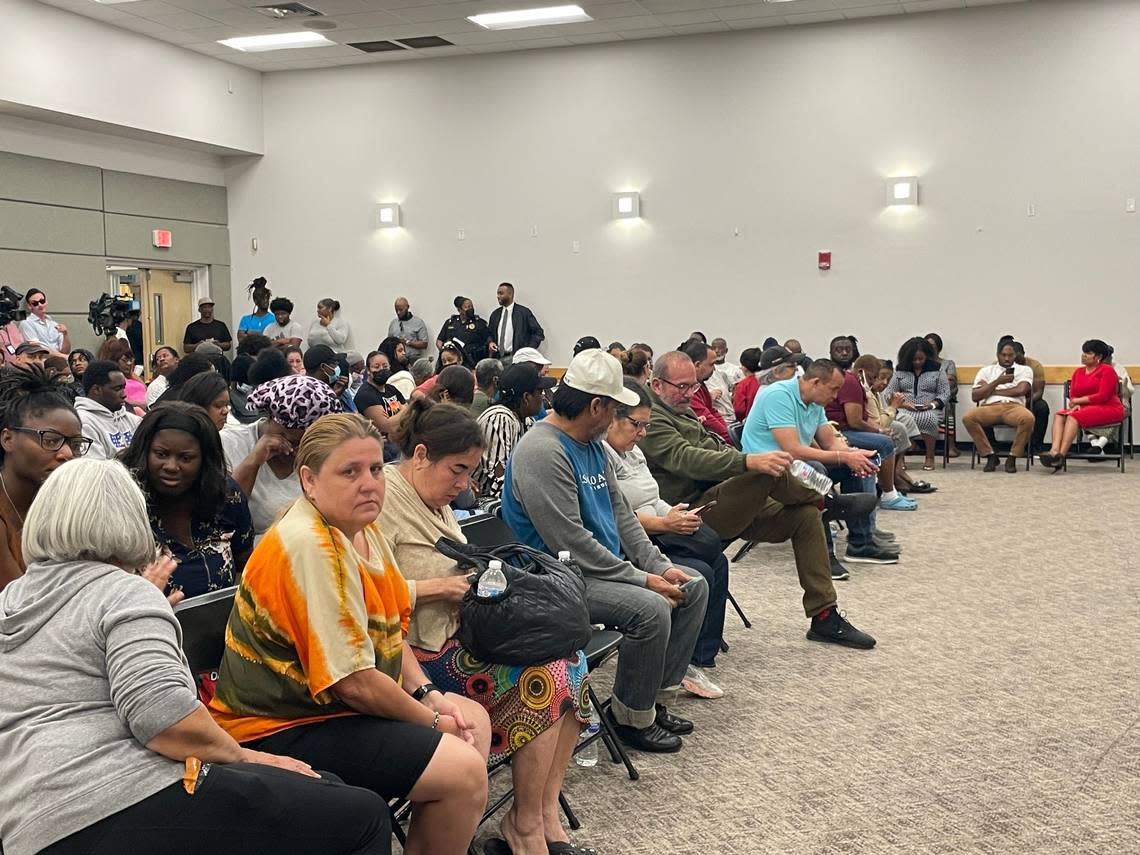‘Where is the money?’: Angry residents claim fire-gutted condo lacks insurance they paid for
For two days, Gustavo Gonzalez has been wearing the same blue shirt and camo-printed pants.
They’re the same clothes he had on when his condo building went ablaze on Saturday. Gonzalez, like more than 100 other residents, was displaced when fire engulfed dozens of units at a two-story building at 395 NW 177th St. in Miami Gardens.
On Monday morning, residents gathered for a meeting at the Betty T. Ferguson Recreational Complex, a shelter almost five miles from the condo building. Representatives from the South Florida Red Cross and Miami-Dade County Office of Housing Advocacy were there to open files and offer help, whether residents were staying at the shelter or not.
A Red Cross volunteer grabbed a microphone and took the crowd’s questions. But she wasn’t the person they wanted up there.
Their audience was fixated on a woman in a red dress and heels. That was Denise Chambers, the New World Condominium’s property manager.

Residents muttered to themselves as Chambers went up to speak. They then blurted out questions.
“What’s going to happen to the condo owners?” they shouted. “¿Dónde está el dinero?” “Where is the money?”
“The money” referred to funds collected from unit owners to pay condo association fees, which cover the cost of running the building, including maintenance, insurance, paying a management company and cleaning, among other responsibilities. That would not include insurance for individual units, which is the responsibility of the unit owners and is generally required by mortgage issuers.
Chambers told the enraged crowd that the building didn’t have fire insurance — that the insurance had been canceled. The Herald was unable to confirm if that was true. In any event, she said ensuring that fire insurance had been secured was the responsibility of the condo association.
Florida law says she is right.
“As the property manager, all I can do is give the board information,” she said.
As for board members themselves, they were invited to identify themselves. No one stepped forward. Efforts by the Herald to reach board members were unsuccessful.
Police lined up along the walls of the room as the tension boiled. An officer volunteered to translate what Chambers was saying for Spanish-speaking residents who felt left behind.
Shortly after, Chambers walked out of the meeting without answering questions about the fees residents had been paying. Residents said they have been told they’re expected to pay those fees even while displaced from their homes.
“Now that we’re all here, we needed all our questions answered,” Gonzalez said. “Everyone is sorry and feels our pain, but we are on the street.”
Gonzalez, who purchased his condo in 1996, said he has sacrificed for almost three decades to pay off his mortgage. Every month, he has paid hundreds in association fees, which are supposed to include insurance.
“If we pay for insurance, and we don’t have any, where is that money going?” said Gonzalez, who spoke to the Herald in Spanish like many of the displaced residents.
Gonzalez is now worried about what’s next for him. Rents in Miami are among the most expensive in the United States.
“Who is going to pay our property damage?” he said. “We lost everything. Who is going to help us?”
Rita Eizmendiz, who lives with her husband in the condo he purchased 26 years ago, feels like she and other residents have been abandoned.
Decisions, Eizmendiz said, are often made without considering or informing residents who don’t speak English. It was an issue she wanted to raise at the February board meeting.
“I haven’t understood anything [Chambers] said,” she told the Herald. “That happens a lot. That’s one of the difficulties in our meetings.”
She also said aside from the fire insurance, she wonders if there are other things for which the association is collecting money while no vendor was actually hired.
“I’m the one who cleans the halls,” she said. “Ask anyone. I’m the one who takes care of the gardens. What maintenance are we paying?”
As the crowd exited the room, police sent reporters out of the building. Residents chattered, their voices echoing down the halls.
“This was a slap in the face,” one resident said.
“We’ve been deceived.”
